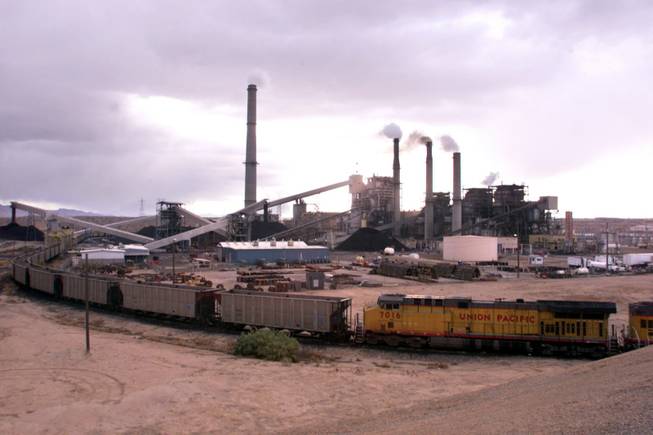
A Union Pacific train unloads its coal Friday, Dec. 10, 1999 at Nevada Power Company’s Reid Gardner power station near Moapa.
Sunday, April 14, 2013 | 2 a.m.
Sun coverage
WASHINGTON -- NV Energy earned some accolades recently by announcing a plan to kick the coal habit and wean its electrical portfolio off coal-fired power plants.
Other states might start following suit, but don’t necessarily count that as a credit to Nevada’s example. Regardless of Congress’ foundering attempts to bring up comprehensive energy legislation, experts from both sides of the political spectrum see a future in which regulations and market forces will start pricing such plants out of the market.
“President (Barack) Obama made it clear in his State of the Union address that if Congress fails to act, he will,” said Daniel Weiss, an energy expert with the Center for American Progress, a progressive think tank in Washington, D.C. “Now that doesn’t mean that he’s going to issue carbon standards for power plants tomorrow ... but it’s not unreasonable to think that if the EPA develops carbon pollution standards for existing power plants, they will probably be finalized as soon as 2015.”
In its announcement, NV Energy indicated it would begin shutting down the coal-fired power plants at Reid-Gardner in 2014 with plans to complete that operation by 2017. The utility would then move to shut down its remaining coal plants by 2025.
In other parts of the country — Georgia, Pennsylvania and West Virginia — other coal closures are underway.
Pro-coal actors largely blame the trend on what they say are too-stringent Environmental Protection Agency regulations, such as the Clean Air Act, the Mercury and Air Toxics Standards, rules on ozone depletion, and a contested rule on cross-state air pollution.
Some of those rules predate Obama.
But others were designed by Gina McCarthy, the chief administrator for the EPA’s air pollution branch — and a candidate to become head of the EPA. If she passes congressional muster, coal’s supporters are bracing for more of a squeeze to the industry soon.
“I think the agency’s plan is to really throw as many of these regulations at the wall as they can and see which ones can stick,” said Nicolas Loris, an energy economist at the Heritage Foundation, a conservative think tank in Washington, D.C. “I think it’s going to be very difficult for coal production to stay in business with the regulations that are in place and the ones that are coming online.”
But federal regulations aren’t the only element affecting the efficiency of manufacturing electricity via coal-fired plants. So, too, are state regulations and the affordability of alternatives.
In the case of NV Energy’s announcement, and across the country, power providers are looking most closely at natural gas as a coal alternative. As a fuel source, it is projected as cheaper, more compact to produce and less vulnerable to inclement weather than pure solar or wind energy production. But most importantly, it is the one area of the energy fuels portfolio in which Congress could make significant strides in the near future.
Senate Energy Committee Chairman Ron Wyden, D-Ore., and ranking member Lisa Murkowski, R-Alaska, have started discussions about legislation to address fracking, production and promotion of natural gas use. The preference among Democrats is to limit exports to keep domestic prices low. The tactic would have the side effect of making natural gas the most viable cheap coal alternative.
Of course, none of these expected changes — natural gas legislation or updated EPA regulations — will come without a fight, either in the political arena or in the courts.
But with proponents and opponents of coal fairly convinced of the trajectory, NV Energy’s decision may not have been so prescient as simply prudent and practical for a state utility with a relatively small group of coal-fired power plants to worry about.

Join the Discussion:
Check this out for a full explanation of our conversion to the LiveFyre commenting system and instructions on how to sign up for an account.
Full comments policy